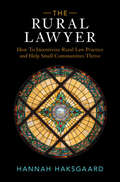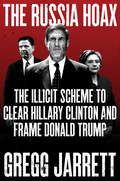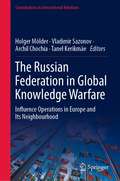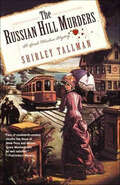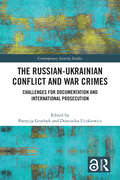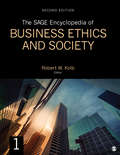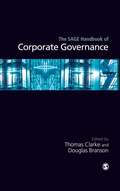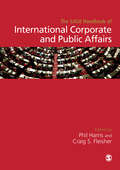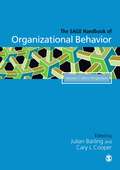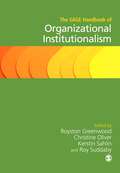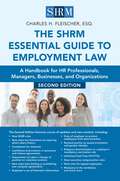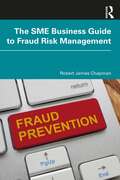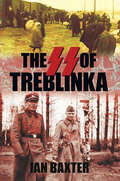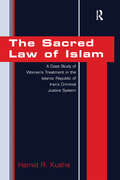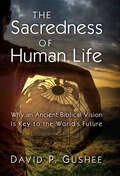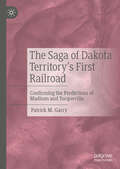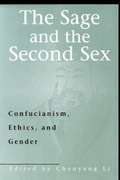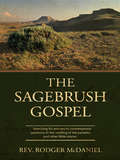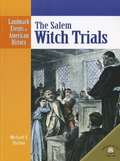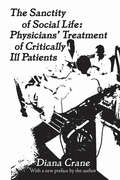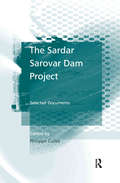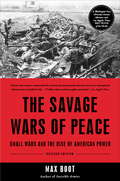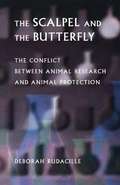- Table View
- List View
The Rural Lawyer: How To Incentivize Rural Law Practice and Help Small Communities Thrive
by Hannah HaksgaardThe Rural Lawyer takes a close look at the challenges facing small-town America, where populations are dwindling and aging lawyers are not being replaced by new graduates. With interviews and personal accounts, the book shows how incentive programs can address this access-to-justice crisis. It specifically examines the South Dakota Rural Attorney Recruitment Program, which is the first program of its kind in the US and has seen great success in helping to attract new lawyers to small towns. Chapters also explore the larger context of rural economic development and its relationship to the law. With insightful analysis and real-life examples, The Rural Lawyer provides readers with a deep understanding of the challenges facing rural communities and the role that lawyers can play in helping these areas thrive.
The Russia Hoax: The Illicit Scheme to Clear Hillary Clinton and Frame Donald Trump
by Gregg JarrettFox News legal analyst Gregg Jarrett reveals the real story behind Hillary Clinton’s deep state collaborators in government and exposes their nefarious actions during and after the 2016 election. <P><P>The Russia Hoax reveals how persons within the FBI and Barack Obama’s Justice Department worked improperly to help elect Hillary Clinton and defeat Donald Trump in the 2016 presidential election. <P><P>When this suspected effort failed, those same people appear to have pursued a contrived investigation of President Trump in an attempt to undo the election results and remove him as president. <P><P>The evidence suggests that partisans within the FBI and the Department of Justice, driven by personal animus and a misplaced sense of political righteousness, surreptitiously acted to subvert electoral democracy in our country. <P><P>The book will examine: <P><P>How did Hillary Clinton manage to escape prosecution despite compelling evidence she violated the law? <P><P>Did Peter Strzok, James Comey, Andrew McCabe, Loretta Lynch, and others obstruct justice by protecting Clinton? <P><P>Why was there never a legitimate criminal investigation of Clinton in the Uranium One case?Are the text messages exchanged between Strzok and FBI lawyer Lisa Page evidence of a concerted effort to undermine the electoral process? <P><P>Was there ever any real evidence of "collusion" between Trump and the Russians? <P><P>Did Trump obstruct justice in the firing of Comey or was he legally exercising his constitutional authority? <P><P>Did the FBI and DOJ improperly use a discredited "dossier" about Trump to obtain a FISA warrant to spy on Trump associates? <P><P>Should Muller have disqualified himself under the special counsel law based on glaring conflicts of interest? <P><P>Was fired National Security Adviser Michael Flynn unfairly charged with making a false statement? <P><P>With insightful analysis and a fact-filled narrative, The Russia Hoax delves deeply into Democrat wrongdoing. <P><b>A New York Times Bestseller</b>
The Russian Federation in Global Knowledge Warfare: Influence Operations in Europe and Its Neighbourhood (Contributions to International Relations)
by Tanel Kerikmäe Archil Chochia Holger Mölder Vladimir SazonovThis book examines Russian influence operations globally, in Europe, and in Russia’s neighboring countries, and provides a comprehensive overview of the latest technologies and forms of strategic communication employed in hybrid warfare. Given the growing importance of comprehensive information warfare as a new and rapidly advancing type of international conflict in which knowledge is a primary target, the book examines Russia’s role in Global Knowledge Warfare. The content is divided into three parts, the first of which addresses conceptual issues such as the logic of information warfare, the role of synthetic media, and Russia’s foreign policy concepts, including the impact of the COVID-19 pandemic on influence operations. The second part analyzes technological, legal and strategic challenges in modern hybrid warfare, while the third focuses on textual, cultural and historical patterns in information warfare, also from various regional (e.g. the Western Balkans, Romania, Ukraine, and the Baltic) perspectives. The book is primarily intended for scholars in the fields of international relations, security and the military sciences who are interested in Russian foreign policy and influence operations, but also their impact on the global security environment.
The Russian Hill Murders: A Sarah Woolson Mystery (Sarah Woolson Mysteries #2)
by Shirley TallmanThough her own San Francisco law firm barely tolerates her, gutsy young attorney Sarah Woolson flouts proper feminine behavior in this nineteenth-century answer to Legally Blonde. While her mother begs her to settle down, her chauvinistic boss tries to come up with ever more spiteful ways to pressure his only female associate into quitting. Naturally, Sarah digs in her heels and vows to retain her position at any cost. Besides, she has no intention of straying too far from the action.When the wife of wealthy society entrepreneur Leonard Godfrey drops dead of an apparent heart attack at a charity dinner for the new Women and Children's Hospital, Sarah's curiosity gets the better of her. But no one will believe in her theory that Caroline Godfrey's death was not natural---until several more people affiliated with the hospital die of inexplicable causes.Meanwhile, when a pregnant widow whose husband has died in a sweatshop fire asks for Sarah's help in finding the owner so that she can sue for recompense, our feisty heroine insists on taking the case against her boss's orders. With the help of her colleague Robert Campbell and an eager young hansom cabdriver named Eddie, Sarah goes on a manhunt for Killy Doyle, the menacing head of the factory underworld. But she can't ignore the mysterious deaths at the Women and Children's Hospital---especially when the hospital's Chinese chef is arrested for the murders and the Chinese community's most powerful Tong Lord asks her to defend him.Faced with her first criminal trial, Sarah stops at nothing to determine the killer's identity. But in trying to exonerate her client, she places her own life in danger. Will Sarah figure out who the murderer is, or will she be the final victim?
The Russian-Ukrainian Conflict and War Crimes: Challenges for Documentation and International Prosecution (Contemporary Security Studies)
by Patrycja Grzebyk Dominika UczkiewiczThis book offers a multidisciplinary examination of the international crimes committed in the Russia-Ukraine War, and the challenges of their prosecution and documentation.As the largest international armed conflict in Europe since World War II, Russia’s war against Ukraine has provoked strong reactions and questions about the post-1945 world order, the utility of the war, and the effectiveness of international criminal justice. Throughout the chapters in this volume, scholars and legal practitioners from Canada, Germany, Poland, Ukraine, the UK, and the United States present the results of interdisciplinary research, insights from the perspective of other post-communist states, and first-hand expertise from directly working on the documentation and prosecution of these crimes. This offers a broader picture of post-Cold War relations and sheds light on the roots and nature of the war and the importance of regional approaches. The chapters also present some possible responses to the crimes committed in the conflict, with a focus on a victims-centered approach to transitional justice.This volume will be of interest to scholars and students of international criminal and humanitarian law, security studies, peace and conflict studies, and Eastern European history.
The SAGE Encyclopedia of Business Ethics and Society
by Robert W. KolbThoroughly revised, updated, and expanded, The SAGE Encyclopedia of Business Ethics and Society, Second Edition explores current topics, such as mass social media, cookies, and cyber-attacks, as well as traditional issues including accounting, discrimination, environmental concerns, and management. The new edition also includes an in-depth examination of current and recent ethical affairs, such as the dangerous work environments of off-shore factories for Western retailers, the negligence resulting in the 2010 BP oil spill, the gender wage gap, the minimum wage debate and increasing income disparity and the unparalleled level of debt in the U.S. and other countries with the challenges it presents to many societies and the considerable impact on the ethics of intergenerational wealth transfers. Key Features Include: Seven volumes, available in both electronic and print formats, contain more than 1,200 signed entries by significant figures in the field Cross-references and suggestions for further readings to guide students to in-depth resources Thematic Reader's Guide groups related entries by general topics Index allows for thorough browse-and-search capabilities in the electronic edition
The SAGE Handbook of Corporate Governance
by Thomas Clarke Douglas BransonThe urgent and sustained interest in corporate governance is unprecedented, with the connections between corporate governance and economic performance being emphasized by the World Bank, the IMF and others in the global economic community. In this timely and definitive intellectual analysis of a key discipline, The SAGE Handbook of Corporate Governance offers a critical overview of the key themes, theoretical controversies, current research and emerging concepts that frame the field. Consisting of original substantive chapters by leading international scholars, and examining corporate governance from an inter-disciplinary basis, the text highlights how governance issues are critical to the formation, growth, financing, structural development, and strategic direction of companies and how corporate governance institutions in turn influence the innovation and development of industrial and economic systems globally. Comprehensive, authoritative and presented in a highly-accessible framework, this Handbook is a significant resource to those with an interest in understanding this important emerging field.
The SAGE Handbook of International Corporate and Public Affairs
by Professor Craig S. Fleisher Professor Phil HarrisThis new edition of The SAGE Handbook of International Corporate and Public Affairs builds on the success of the first edition (2005) by comprehensively updating and enhancing the material and structure, setting a new standard for the practitioner and student of the global public affairs discipline. The new edition includes increased international coverage of the field, and a strong focus on emerging trends, as well as providing a comprehensive overview of the foundations and key aspects of the discipline. The Handbook is organised into six thematic sections, including a generously-sized section devoted to case studies of public affairs in action: Foundations of PA PA and its relationship to other Key Disciplines Emerging Trends in PA The Regional Development and Application of PA Case Studies of PA in Action Tactical Approaches to Executing PA. Containing contributions from leading experts in the field today, this Handbook is designed to serve the needs of scholars, researchers, students and professionals alike.
The SAGE Handbook of International Corporate and Public Affairs
by Professor Craig S. Fleisher Professor Phil HarrisThis new edition of The SAGE Handbook of International Corporate and Public Affairs builds on the success of the first edition (2005) by comprehensively updating and enhancing the material and structure, setting a new standard for the practitioner and student of the global public affairs discipline. The new edition includes increased international coverage of the field, and a strong focus on emerging trends, as well as providing a comprehensive overview of the foundations and key aspects of the discipline. The Handbook is organised into six thematic sections, including a generously-sized section devoted to case studies of public affairs in action: Foundations of PA PA and its relationship to other Key Disciplines Emerging Trends in PA The Regional Development and Application of PA Case Studies of PA in Action Tactical Approaches to Executing PA. Containing contributions from leading experts in the field today, this Handbook is designed to serve the needs of scholars, researchers, students and professionals alike.
The SAGE Handbook of Organizational Behavior: Volume One: Micro Approaches
by Dr Cary P. Cooper Dr Julian BarlingThis milestone handbook brings together an impressive collection of international contributions on micro research in organizational behavior. Focusing on core micro organizational behaviour issues, chapters cover key themes such as individual and group behaviour. The SAGE Handbook of Organizational Behavior Volume One provides students and scholars with an insightful and wide reaching survey of the current state of the field and is an indespensible road map to the subject area. The SAGE Handbook of Organizational Behavior Volume Two edited by Stewart R Clegg and Cary L Cooper draws together contributions from leading macro organizational behaviour scholars.
The SAGE Handbook of Organizational Institutionalism
by Roy Suddaby Royston Greenwood Christine Oliver Kerstin Sahlin-AnderssonInstitutional theory lies at the heart of organizational theory yet until now, no book has successfully taken stock of this important and wide-ranging theoretical perspective. With insight and clarity, the editors of this handbook have collected and arranged papers so readers are provided with a map of the field and pointed in the direction of new and emerging themes. The academics who have contributed to this handbook are respected internationally and represent a cross-section of expert organization theorists, sociologists and political scientists. Chapters are a rich mix of theory, how to conduct institutional organizational analysis and empirical work. The SAGE Handbook of Organizational Institutionalism will change how researchers, teachers and advanced students think about organizational institutionalism.
The SHRM Essential Guide to Employment Law: A Handbook for HR Professionals, Managers, Businesses, and Organizations
by Charles H. FleischerUnderstanding workplace law is essential for managing risk and maintaining strong employer-employee relationships. The SHRM Essential Guide to Employment Law is a clear, practical reference covering over 200 employment law topics that employers, HR professionals and small business owners are most likely to encounter. Using accessible language and real-world examples, it explains key legal principles, flags potential pitfalls and helps readers know when to seek professional counsel. Each chapter highlights core issues and offers concrete guidance to support compliance and better decision-making.Fully updated in its second edition, the guide includes new content on remote work, severance agreement provisions, salary history inquiries, non-compete restrictions, NLRB rules and more making it an indispensable resource for today's workplace.
The SME Business Guide to Fraud Risk Management
by Robert James ChapmanAll organisations are affected by fraud, but disproportionately so for SMEs given their size and vulnerability. Some small businesses that have failed to manage business fraud effectively have not only suffered financially but also have not survived. This book provides a guide for SMEs to understand the current sources of business fraud risk and the specific risk response actions that can be taken to limit exposure, through the structured discipline of enterprise risk management. The book provides: A single-source reference: a description of all of the common fraud types SMEs are facing in one location. An overview of enterprise risk management: a tool to tackle fraud (as recommended by the Metropolitan Police Service and many other government-sponsored organisations). Illustrations of fraud events: diagrams/figures (where appropriate) of how frauds are carried out. Case studies: case studies of the fraud types described (to bring the subject to life and illustrate fraud events and their perpetrators) enabling readers to be more knowledgeable about the threats. Sources of support and information: a description of the relationship between the government agencies and departments. What to do: ‘specific actions’ to be implemented as opposed to just recommending the preparation of policies and processes that may just gather dust on a shelf. The book gives SMEs a much better understanding of the risks they face and hence informs any discussion about the services required, what should be addressed first, in what order should remaining requirements be implemented and what will give the best value for money.
The SS of Treblinka
by Ian BaxterIn January 1942 senior officials of the Nazi regime met to discuss the ‘final solution to the Jewish question’, at a gathering that became known as the Wannsee Conference. As part of the resulting Operation Reinhard, camps were built with one aim in mind, not to imprison the Jews, but to kill them. By the time the extermination camp of Treblinka was made fully operational in July 1942, the SS had built a killing factory capable of despatching hundreds of thousands of people which could be run by only a handful of guards. But who were these men who ran Treblinka, many of whom had volunteered for the job? Were they ordinary people following terrible orders, or were they monsters? In The SS of Treblinka, Ian Baxter reveals the true natures of the men who during the camp’s short operation, murdered some 850,000 Jews. Some of them appeared outwardly to have been kind family men who then inflicted terrible cruelties on those in their power, while a few were afterwards spoken about with affection and gratitude by survivors. Using official documents, trial transcripts and private correspondence, he describes how these men lived day to day, inured to scenes of tragedy, eating and drinking the provisions their victims had brought with them under the delusion that they would be resettled, and what they thought of the thousands of people who arrived at the rail station positioned only metres from the gas chambers, whose bodies they would oversee being burned within the hour.
The Sacred Law of Islam: A Case Study of Women's Treatment in the Islamic Republic of Iran's Criminal Justice System
by Hamid R. KushaIslam’s Sacred Law is one of the most complex, detailed and comprehensive legal theories that Islam, as a Western religion, has produced in its capacity as a doctrine of social justice. However, few available texts have dealt with the treatment of women under the actual system of justice that adheres to Islam’s Sacred Law. This book fills this void by providing a much needed comprehensive study of the application of the Sacred Law to women under the Islamic Republic of Iran’s justice system. It will be a fascinating guide to all those interested in comparative law, criminal justice and the sociology of law.
The Sacredness of Human Life: Why an Ancient Biblical Vision Is Key to the World's Future
by David P. GusheeThis authoritative book is the most comprehensive examination ever of the sacredness of human life. Never before has one volume explored this subject in such a multifaceted way, encompassing biblical roots, theological elaborations, historical cases, and contemporary ethical perspectives. Tracing the concept of the sacredness of human life from Scripture through church history to the present day, David Gushee argues that viewing human life as sacred is one of the most precious legacies of biblical faith — albeit one that the church has too often failed to uphold. Besides providing a masterful historical survey, Gushee’s discussion covers the many current ethical challenges and perspectives that will impact the survival and flourishing of human life, including biotechnology, the death penalty, abortion, human rights, nuclear weapons, just war theory, women’s rights, and creation care.Gushee’s Sacredness of Human Life is a game-changing book that will set the standard for all future discussions of this key ethical concept.
The Saga of Dakota Territory's First Railroad: Confirming the Predictions of Madison and Tocqueville
by Patrick M. GarryThis book focuses on a key case study in the history of American territories, public works, transportation and the constitutional system of checks and balances. The saga of Yankton County’s attempt to bring the first railroad into Dakota Territory in 1873 covers 25 years of territorial history, leading up to statehood for South Dakota in 1889. Garry investigates the array of unusual facts and occurrences within the story of the Dakota Southern, which was the first railroad stretching into the Territory. Lawsuits worked themselves all the way up to the Supreme Court. The most notorious shooting in the territory occurred in connection with railroad disputes The failure of Yankton to pay interest on the bonds used to finance the railroad—a failure initially prompted by a court injunction against such payment—may have delayed statehood for the entire territory. But the primary focus of this railroad story revolves around the way it highlights the predictions and observations of two of America’s most noted thinkers: Alexis de Tocqueville and James Madison. It shows the tension between Tocqueville’s impressions of the enterprising, risk-taking, and association-minded nature of Americans and Madison’s warnings about a federal government exercising unprecedented powers and having expanded beyond adequate checks. It works through the abstract observations of Tocqueville and Madison with tangible examples that are still relevant today.
The Sage And The Second Sex: Confucianism, Ethics, and Gender
by Chenyang LiThis volume offers new insights into the role of women in ancient China, their important contributions to society, and their pursuit of personal growth and fulfillment. The position that Confucianism may actually foster gender equity is particularly interesting in discussions of whether the Confucian worldview is degrading or repressive toward women.
The Sagebrush Gospel: Searching for answers to contemporary questions in the retelling of the parables and other Bible stories.
by Rodger McdanielMcDaniel's critical examination of the state of the world searches for answers to contemporary questions about oppression and greed. He interprets the parables and other Bible stories adapting their messages to our times with wit and sharp commentary.
The Salem Witch Trials (Landmark Events In American History Series)
by Michael V. UschanThe Salem Witch Trials by Michael V. Uschan
The Sanctity of Life and the Criminal Law
by Dennis J. Baker Jeremy HorderDescribed by The New York Times as 'Britain's foremost scholar of criminal law', Professor Glanville Williams was one of the greatest academic lawyers of the twentieth century. To mark the centenary of his birth in 2011, leading criminal law theorists and medical law ethicists from around the world were invited to contribute essays discussing the sanctity of life and criminal law while engaging with Williams' many contributions to these fields. In re-examining his work, the contributors have produced a provocative set of original essays that make a significant contribution to the current debate in these areas.
The Sanctity of Social Life: Physicians Treatment of Critically Ill Patients
by Diana CraneFor years, speculation has been mounting among lawyers, church leaders, social scientists, and the general public over the question of prolongation of life and the critically ill patient's "right to die." But what is the physician's attitude toward this controversial subject? Under what conditions does a doctor battle to save the life of the patient, and when does he decide to withdraw medical treatment and allow death to occur? The answers to these questions form the basis of this book, a fascinating examination of the nature of death and dying, as seen from the physician' point of view.
The Sardar Sarovar Dam Project: Selected Documents
by Philippe CulletThe Sardar Sarovar Project has been one of the most debated development projects of the past several decades at both an international level and within India itself. Cullet's volume brings together all the key documents relating to the project: including those pertaining to World Bank loans, the judicial pronouncements of the Supreme Court and documents relating to specific local level issues - in particular environment and rehabilitation. The work includes an introductory section focusing on the history of the project, the involvement of the different actors, the impacts on the local population, and a general analysis of the controversy surrounding it. In providing an easily accessible source for all the main documents relating to this landmark project, this compilation will be a valuable resource for researchers and policy-makers working in the areas of International Environmental Law and International Development Law.
The Savage Wars Of Peace: Small Wars And The Rise Of American Power
by Max BootAmerica's "small wars," "imperial wars," or, as the Pentagon now terms them, "low-intensity conflicts," have played an essential but little-appreciated role in its growth as a world power. Beginning with Jefferson's expedition against the Barbary Pirates, Max Boot tells the exciting stories of our sometimes minor but often bloody landings in Samoa, the Philippines, China, Haiti, the Dominican Republic, Nicaragua, Mexico, Russia, and elsewhere. Along the way he sketches colorful portraits of little-known military heroes such as Stephen Decatur, "Fighting Fred" Funston, and Smedley Butler. From 1800 to the present day, such undeclared wars have made up the vast majority of our military engagements. Yet the military has often resisted preparing itself for small wars, preferring instead to train for big conflicts that seldom come. Boot re-examines the tragedy of Vietnam through a "small war" prism. He concludes with a devastating critique of the Powell Doctrine and a convincing argument that the armed forces must reorient themselves to better handle small-war missions, because such clashes are an inevitable result of America's far-flung imperial responsibilities.
The Scalpel and the Butterfly - The Conflict Between Animal Research and Animal Protection
by Deborah RudacilleIn this sweeping history of animal research and the animal protection movement, Deborah Rudacille examines the ethical question of whether enhancement of human life justifies the use of animals for research. She shows how the question and the answers provided by both scientists and anti-vivisectionists over the past 150 years have shaped contemporary society. Rudacille anchors her narrative in events from the lives of key players in the history of the war between science and animal protection, describing the work of activists who work outside the law as well as those working to change the system from within.
